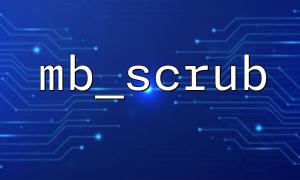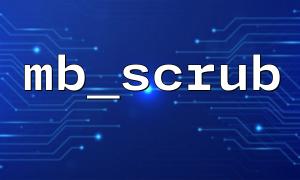In PHP development, handling character encoding is a critical part of the process, especially when developing multilingual websites or applications. mb_scrub is a PHP multibyte string handling function often used to ensure that the character encoding of a string is as expected, preventing garbled text or incorrect character processing. So, can mb_scrub effectively handle multilingual content? How does it perform in multilingual environments? This article provides an in-depth analysis.
mb_scrub is a function provided by the PHP mbstring extension. Its purpose is to clean illegal characters in a string and convert the string to a specified character encoding. The basic syntax is as follows:
<span><span><span class="hljs-title function_ invoke__">mb_scrub</span></span><span>(</span><span><span class="hljs-keyword">string</span></span><span> </span><span><span class="hljs-variable">$str</span></span><span>, </span><span><span class="hljs-keyword">string</span>|</span><span><span class="hljs-literal">null</span></span><span> </span><span><span class="hljs-variable">$encoding</span></span><span> = </span><span><span class="hljs-literal">null</span></span><span>): </span><span><span class="hljs-keyword">string</span></span><span>
</span></span>$str: The string to be processed.
$encoding: The target character encoding, defaulting to the current internal encoding (usually UTF-8).
When processing a string, mb_scrub checks each character to see if it conforms to the specified encoding. Any invalid characters are removed or replaced with valid ones, ensuring the returned string is valid.
In multilingual application development, handling multiple character encodings is often required, which means PHP must correctly process characters from different languages. mb_scrub performs exceptionally well in multilingual environments, especially under UTF-8 encoding. It can remove invalid characters and ensure encoding consistency.
Under UTF-8 encoding, mb_scrub is compatible with various languages, including Chinese, Japanese, Korean, and Arabic. These languages often use multibyte character sets, and mb_scrub effectively handles and cleans any illegal characters.
For example, given a string containing Chinese, English, and Japanese characters:
<span><span><span class="hljs-variable">$str</span></span><span> = </span><span><span class="hljs-string">"你好, Hello, こんにちは!"</span></span><span>;
</span><span><span class="hljs-variable">$cleaned_str</span></span><span> = </span><span><span class="hljs-title function_ invoke__">mb_scrub</span></span><span>(</span><span><span class="hljs-variable">$str</span></span><span>, </span><span><span class="hljs-string">'UTF-8'</span></span><span>);
</span><span><span class="hljs-keyword">echo</span></span><span> </span><span><span class="hljs-variable">$cleaned_str</span></span><span>; </span><span><span class="hljs-comment">// Output: 你好, Hello, こんにちは!</span></span><span>
</span></span>As shown, mb_scrub preserves multibyte characters correctly without mishandling them.
In multilingual websites or applications, inconsistent character encodings may occur. For example, strings from different sources may have different encodings, or database storage may be inconsistent. mb_scrub ensures these strings are converted to a consistent encoding, preventing garbled text.
<span><span><span class="hljs-variable">$str</span></span><span> = </span><span><span class="hljs-string">"Hello, \xE2\x98\x83"</span></span><span>; </span><span><span class="hljs-comment">// Assume this is a string with inconsistent encoding</span></span><span>
</span><span><span class="hljs-variable">$cleaned_str</span></span><span> = </span><span><span class="hljs-title function_ invoke__">mb_scrub</span></span><span>(</span><span><span class="hljs-variable">$str</span></span><span>, </span><span><span class="hljs-string">'UTF-8'</span></span><span>);
</span><span><span class="hljs-keyword">echo</span></span><span> </span><span><span class="hljs-variable">$cleaned_str</span></span><span>; </span><span><span class="hljs-comment">// Output: Hello, ?</span></span><span>
</span></span>Using mb_scrub resolves inconsistent character encoding issues without disrupting the original multilingual content.
Sometimes, strings may contain illegal or invisible characters that can cause display issues or program errors. mb_scrub removes these invalid characters, ensuring the output string conforms to the expected encoding.
Although mb_scrub performs well with multilingual strings, it has some limitations:
No support for character encoding conversion: mb_scrub does not convert characters from one encoding to another. For encoding conversion, use the mb_convert_encoding function.
Cannot handle complex character repairs: For complex character issues (e.g., BOM in UTF-8 strings), mb_scrub may not automatically fix them. Developers might need additional logic to handle these cases.
Overall, mb_scrub is a very useful function, particularly for handling character encoding in multilingual environments. It ensures encoding consistency, cleans illegal characters, and is compatible with various multibyte character sets. While it may not automatically resolve all complex cases, for most everyday development needs, mb_scrub provides reliable support.
If your project involves multilingual support, mb_scrub can help maintain consistent character encoding, enhancing the robustness and maintainability of your application.




